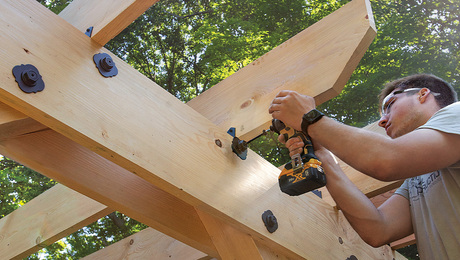I currently have four wind turbines installed near the peak of my roof on my A- Frame Style home. I was wondering if it would be ok to block those vents in the winter to reduce the cold air that migrates up through the soffit vents into the attic and exiting the turbines. My home was built in the late 1980’s with an addition in 2008. It does have a few air leaks and I suspect that on very windy days that the air moving through those vents might be a bit turbulent and therefore adding to the existing air leaks. So would it be OK to block off those 4 turbine vents during the winter months in an effort to save reduce energy costs.
Sincerely appreciate your advice as I’m not an expert in this area.
Thanks
Frank



















Replies
depends on where you live and what climate you see during the winter. might not be a good idea if you are in a snow zone.
Actually, closing vents is a lousy idea in a snow zone. Leads to ice dams.
Attic Vents
Jose,
Thank you for responding! I live in Iowa and suspect that the ever present chance of frost is the major concern. At any rate I thank you once again for responding.
frank
Tricky subject
First, I suspect you're right that closing the vents would make your insulation work better. Air washing over insulation doesn't improve its worth.
However, it's a tricky question. Unlike what a lot of folks think, the primary purpose of roof vents isn't to cool the attic or roof in the summer. They actually do a lousy job at that. Their primary purpose is ridding the roof of excess moisture, and they can do that pretty well, so closing them might rot your roof. But a better question might be where the moisture comes from. Generally, it's from a damp foundation, and the stack effect drives the moisture into the roof through holes in the framing and holes in the ceiling. Holes in the ceiling can be particularly bad. Some of the worst are around can lights, or in a lot of A-frames, through T&G ceiling finishes that aren't installed over some sort of air barrier such as drywall.
So, it's a really complicated question with some nuanced answers. Our sister site, greenbuildingadvisor.com, might be a better place for answers.
And it should be noted that the "turbines" are considered by many to not be particularly effective in the first place -- they don't move nearly as much air as one would think.
Don't block those vents,if you block them it will make the attic sweat and the water will condensate under the insulation due to heat created.It may even cause mold and mildew problem which can be worse.Keep your room well insulated at ceiling.
https://twitter.com/VentisAus
Attic Vents
Thank you all for the very good advice on my question concerning blocking attic vents in the winter. Per your comments, blocking is not an option and your advice is very much appreciated.
Thank you all for your responses !
Roofs, vents, air leaks, water vapor, cold, expence.
Let's try to clear this up, the main problem is the wind.
The wind blowing over and past a home creates an uplift above the roof (like an aircraft’s wing) and this uplift is always trying to lift the roof off.
Of course roofs are often lifted off in strong winds.
This uplift creates an area of low pressure above the roof, this in turn means the air inside the roof (and the home) is pulled out. This produces another area of low pressure inside the home, and this in turn is filled with dry cold air, via all the holes and cracks in the home.
This makes the home cold, on comes the heating, and up goes your heating costs.
This is why after the first oil crises in the 70's, people started to look at why homes are so cold and what can be done about it.
Enter the first super insulated homes and the Passive House. All these are air sealed to keep the warm air in.
So yes it is good practice to block vents in roofs, and everywhere else where they are merely dependent on the strength of the wind to work. Having controlled ventilation is best. The way to stop water vapor getting into the roof is, to block all holes and cracks, where ever they are in the home, air cannot go out, if there is no where else for the wind to come in.
Keep in mind that dry wall is transparent to water vapor, and it needs to be sealed with either gloss or latex paint to stop it entering the roof and walls.
Note: Water vapor is formed by people in the home, by breathing, sweating, washing, drying - it does not come from the ground, or the outside. In winter the air outside is always colder and drier than the air indoors. In heating areas there are a few summer days where the air is warmer and wetter than that indoors.
Yes, block the vents, but deal with the possible water vapor problem, seal your ceilings and the rest of your home, to stop your warm air and water vapor getting into the roof. Wood is hygroscopic it soaks up water vapor from the air, this can lead to mold and wood rot, but usually the wood dries out in the heat of summer and the problem goes away.
Blocking Turbines / Attic Vents
Thank you for your resonse. Looks as though I would have to undertake the task of completley sealing off the areas of leakage which might be quite a task but effective as you recommend.
Thanks again!
Frank
Make sure you understand what "complete" means.